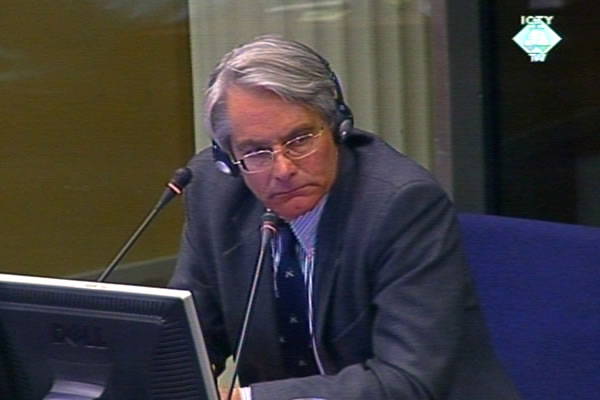Home
MLADIC’S INTENTIONS IN SREBRENICA WERE MISREAD
When Mladic’s forces launched their attack on Srebrenica in early July 1995, the UN headquarters in Sarajevo read it as a ‘local clash’, a Serb response to previous Muslim attacks from the enclave. ‘I think that the people in my headquarters failed to understand this attack would lead to the total collapse of the enclave’, former UNPROFOR commander Rupert Smith admitted as he continued his evidence at the trial of Radovan Karadzic
 Rupert Smith, witness at the Radovan Karadzic trial
Rupert Smith, witness at the Radovan Karadzic trial When Mladic’s troops launched their attack on the protected area of Srebrenica in July 1995, UNPROFOR commander in BH General Rupert Smith was vacationing on the Adriatic coast. Smith received a call from the Sarajevo headquarters asking him to cut short his vacation and fly to Geneva to meet the UN Secretary General. The meeting was not prompted by the attack on the enclave but by the need to draft the regular UNPROFOR report.
At the trial of former Republika Srpska president Radovan Karadzic, who is charged with genocide in Srebrenica, Smith recounted that at the meeting in Geneva he received a report that a Dutch ‘blue helmet’ had been killed in the enclave. However, as the assessment was that it was a ‘local clash’ – a Serb response to a previous attack by the Muslim troops from the enclave – they concluded there was no need for Smith to cut short his vacation. General Smith returned to the Adriatic straight from Geneva. ‘I think that the people in my headquarters failed to understand this attack would lead to the total collapse of the enclave’, Smith said today. When it happened, Smith headed to Sarajevo on 11 July 1995 and arrived there the next evening.
In three weeks that followed, Smith had a series of meetings with Mladic: the first on 15 July 1995 took place in Milosevic’s office in Belgrade and other meetings were held in the restaurant Jela in Han Kram, in the Balkan motel in Mrkonjic Grad and in the Ukrainian Battalion base near Zepa. At all the meetings, Smith asked Mladic about what had happened in Srebrenica and asked about the fate of about 2,000 men who had been separated from the women and children. Smith insisted that the International Red Cross and the UNHCR should be allowed access to prisons and prisoner of war camps. Later, when the first reports about mass graves came in, Smith demanded that UNPROFOR be allowed access to those locations. Mladic kept assuring Smith that everything in Srebrenica was ‘as it should be’ and promised to allow the International Red Cross and UNHCR access, but didn’t keep the promise, Smith recounted.
UN Secretary General’s special envoy Yasushi Akashi made the same requests to the Republika Srpska president Radovan Karadzic. Akashi noted there was ‘deep concern in the Security Council’ about the reports of mass crimes. According to the documents the prosecutor showed in court, Karadzic’s response was that he was busy with ‘the events in Banja Luka’; he promised he would look into it.
The final part of the two-day examination-in chief of General Smith focused on the shelling of the Markale market on 28 August 1995. The indictment alleges that 43 persons were killed and more than 70 were injured in the incident. Smith explained that UNPROFOR’s investigation teams concluded beyond reasonable doubt that the mortar shell had been fired from the VRS positions. Based on that conclusion, Smith called in NATO air strikes on Bosnian Serb military targets.
At the beginning of his cross-examination of General Smith, Karadzic quoted various BH Army documents about the daily consumption of ammunition by the units stationed in and around Sarajevo. According to Karadzic, the documents show that on 16 May 1995 the BH Army fired 1,565 and on 24 May 1995 1,764 rounds on the ‘Serb part of Sarajevo’. Karadzic reminded Smith that on 25 May 1995, Smith ordered the air strikes. Karadzic asked Smith if he would have ordered the air strikes against the Serbs for removing their weapons from collections points if he had known that.
‘I would have done the same thing. I knew what was going on’, General Smith replied calmly.
Karadzic was granted a total of 12 hours to cross-examine the last UNPROFOR commander, and will continue his cross-examination tomorrow.
Linked Reports
- Case : Karadzic
- 2011-02-08 GENERAL RUPERT SMITH: ‘KARADZIC OUT OF TOUCH WITH WORLD’
- 2011-02-03 ‘MAPPING’ THE SNIPER TERROR CAMPAIGN IN SARAJEVO
- 2011-02-02 UN IN BOSNIA ‘A WARRING SIDE, NOT PEACE-KEEPING FORCE’
- 2011-02-10 WAS GENERAL SMITH ‘FASCINATED’ WITH RATKO MLADIC?
- 2011-02-11 WHO HAD THE OBLIGATION TO DEMILITARIZE PROTECTED AREAS
- 2011-02-14 EARLY NIGHTFALL IN SARAJEVO
